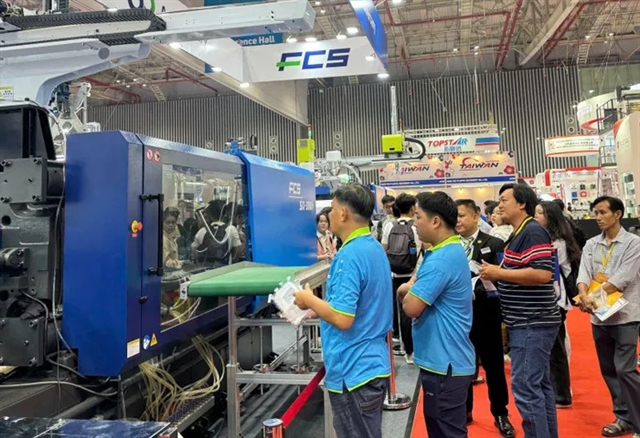 Economy
Economy


|
| Vietnamese businesses learn about new technologies in the rubber and plastics industry at the VietnamPlas 2024 exhibition. — Photo baotintuc.vn |
HÀ NỘI — Việt Nam is becoming a global automotive tyre manufacturing hub, with the export turnover of technical rubber products expected to reach US$4 billion in 2024, according to Nguyễn Quốc Anh, Chairman of the HCM City Rubber and Plastics Manufacturers Association.
Quốc Anh said that Vietnamese rubber and plastics companies are accelerating investments and incorporating recycled materials to improve competitiveness further and foster sustainable development.
Many Vietnamese companies have secured large orders from international partners.
Statistics from Vietnamese companies show that orders for the tyre industry in the last months of 2024 have increased by 10-15 per cent compared to the beginning of the year, while technical rubber product orders have surged by 20-30 per cent.
This is because Vietnamese businesses have proactively secured domestic raw materials, allowing them to offer competitive prices and quality comparable to other countries.
According to Quốc Anh, aiming for a green and circular economy, rubber and plastics companies have been actively increasing the use of recycled plastics in production to meet international market demands, particularly from Northeast Asian markets, including Japan and South Korea.
"Some European and US markets also prioritise recycled products to protect the environment, giving Vietnamese businesses a competitive edge when offering their products," he said.
Phan Tuấn Hùng, Director of the Department of Legal Affairs, Ministry of Natural Resources and Environment, emphasised that Vietnamese plastic products are still facing significant challenges.
The issue of plastic pollution, along with policies aimed at reducing the use of virgin plastics and promoting recycled plastics on a global scale, will pose challenges for businesses in the industry.
“To meet global requirements for plastic products, the Vietnamese plastics and rubber industry needs to seek out new technologies and suitable, environmentally friendly materials to align with the circular economy trend, aiming towards sustainable and eco-friendly plastic products," he said. — VNS




